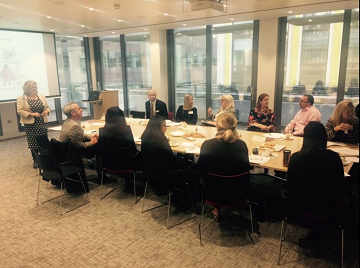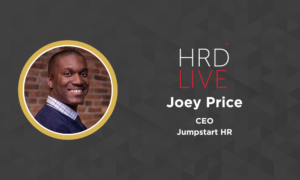Generational issues are front of mind at HRD Roundtable
- 4 Min Read
Last Thursday 24th November saw HR professionals from a wide range of industries gather together to discuss the issue of ‘Building future leaders’ at an HRD Roundtable, organised by HRD Summit in association with Buzzacott.
- Author: Rebecca Sentance
- Date published: Nov 28, 2016
- Categories

Last Thursday 24th November saw HR professionals from a wide range of industries gather together to discuss the issue of ‘Building future leaders’ at an HRD Roundtable, organised by HRD Summit in association with Buzzacott.
The roundtable discussion, held for the second year in a row, brought together professionals from organisations such as UBS, GM Financial and Associated British Ports to debate the burning issues surrounding the development of future leaders in HR.
To start off the event, attendees were asked to name the biggest challenge which they faced in trying to develop the next generation of leaders in their respective businesses, and some clear themes emerged.
The ageing workforce and the possibility of a clash between old and young are at the forefront of many HR professionals’ concerns, as ‘Generation Y’ begin to climb the ranks of organisations occupied by older professionals who are working for longer than ever before. How can organisations update their approach in order to attract younger workers to the business, at the same time as maintaining and developing an ageing workforce?
Some of the most-voiced concerns about building future leaders at #HRDroundtable include the ageing workforce & attracting millennials
— HRD Connect (@HRD_Connect) November 24, 2016
These, of course, are some of the million-dollar questions currently coming out of HR – and companies who can answer them are sure to go far.
Challenges to developing leadership
The group continued to deliberate the obstacles which currently stand in the way of trying to develop strong leadership in any business – many of which are overlapping concerns. They included:
- Old-fashioned attitudes and roles which still persist – one attendee named the role of “stevedore” which still exists in their organisation even though very few are clear on its meaning
- Employees being promoted because of technical skills, rather than leadership skills
- Needing to plan for a longer-term future – and moreover, persuading Boards of Directors of the importance of a longer-term approach. Many Boards of Directors are happy to plan for only one or two years down the line, but balk at the idea of planning five or ten years ahead
- The management challenges brought about by flexible and long-distance working: Virtual teams need to be managed very differently, but this can cause issues with the teams that you manage face-to-face
- The impact of digitalisation – whatever this might mean.
Google’s Joris Merks explains the do’s and don’ts of digitising business
"To survive, you have to take on digitalisation – whatever that means. Otherwise, we will not cope." #HRDroundtable #HRDsummit2017
— HRD Connect (@HRD_Connect) November 24, 2016
How should HR professionals begin to address these issues within their organisations? More often than not, it will fall to leaders to balance the conflicting demands of old and new, and the changing needs of the workforce in a digital age.
Future leaders will need to be developed with the skills to manage expectations. Some employees, particularly of a younger generation, come into the workforce seeking instant gratification, while others are more content to slowly climb the ladder.
It’s also vital for leaders to be aware of their own weaknesses. Rather than trying to cover up their own shortcomings, a good leader should build teams around them who have the qualities that they lack, to compensate for those weaknesses. A leader who lacks technical expertise and yet wants to tackle digitalisation, for example, should surround themselves with employees who have that digital know-how.
Be aware of your weaknesses as a leader, and make sure you build teams around you who have those qualities #HRDroundtable
— HRD Connect (@HRD_Connect) November 24, 2016
Some of the biggest difficulties in cultivating and promoting strong leadership in any organisation come from the fact that a good employee may not necessarily make a good leader. In order to be promoted upwards, employees need to behave in a certain way, but then discover that something completely different is required of them once they take on a leadership role.
On the other hand, it is also important for leaders and managers to maintain a grasp of the ordinary problems faced by their employees on a daily basis, and so taking on a leadership role shouldn’t mean becoming completely detached from the position that they held before. It’s a fine line to tread.
The issues surrounding building strong leadership won’t be solved overnight, but by having proactive discussion around these challenges and working to find solutions, the HR profession can go a long way towards doing so.
Editor’s letter: Identifying leadership and management issues engages the workforce









